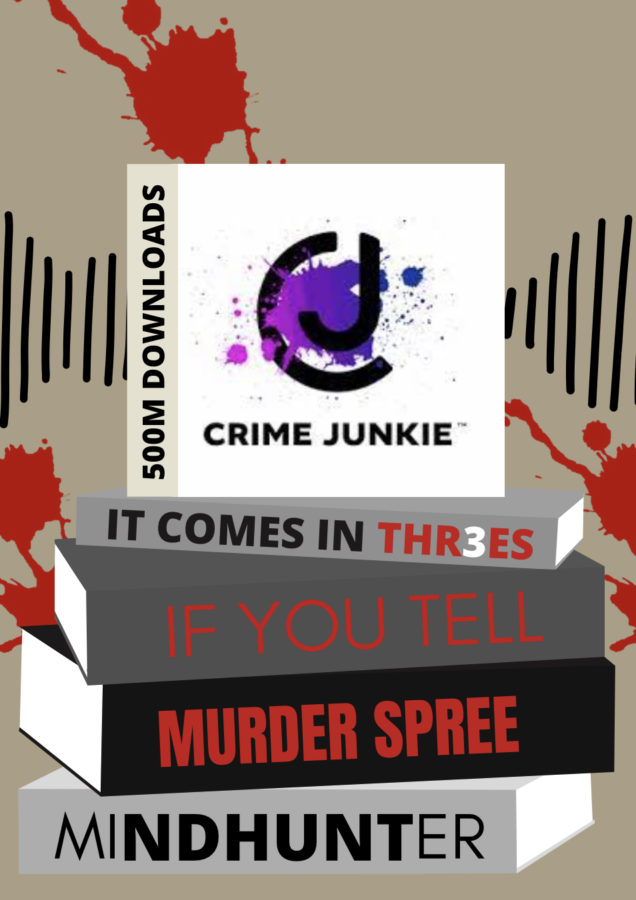True crime takes criminal toll on psychological health
Podcasts, docuseries and books alike comprise the vast true crime genre. However, it’s worth taking into account the adverse mental and emotional effects this content can take.
April 5, 2022
Eerie music plays behind grainy surveillance footage of a figure fleeing through a parking lot until, suddenly, the clip cuts out—only to be replaced with a photo of the same scene splattered in blood. Then, a narrator appears on screen, ready to recount the tragic events that just occurred.
In a time where social media and the monotony of 24-hour news keep individuals thoroughly tuned out from real-life issues, true crime aims to enlighten the public on the heinous murders, assaults and barbarities taking place just under their noses. However, despite any success consuming such grisly content may have in educating and entertaining the masses, its effects are often anything but positive.
Since the publication of Truman Capote’s 1966 novel “In Cold Blood,” which details the infamous Clutter family murders and is considered the blueprint of the true crime genre, several podcasts, books and docuseries have come out with similar premises. For example, Netflix’s “Tiger King,” which amassed a whopping 34 million viewers within 10 days of releasing, features a murder-for-hire plot against animal rights activist Carole Baskin.
Additionally, television channel Headline News dedicates hours on end of its scheduled programming to reports of high-profile crime cases. These and other media are thought to provide, in psychotherapist Kathleen Check’s words, “a particular kind of escapism,” which proved to be especially important during a coronavirus pandemic that left many bored in lockdown.
One could argue that true crime allows viewers to be more involved with current events. The media frenzy around Gabrielle Petito’s disappearance in September 2021 is one glaring example: thousands of users took to the internet to join in on the search for the influencer by scouring her Instagram feed and posting theories about the situation even after authorities recovered her body.
However, issues arise with this sort of speculation when fans delve too deep into the mystery at hand. For one, the sense of self-righteousness from being able to “participate” in unsolved cases can rapidly spiral into vigilantism. According to Political Violence at a Glance (PVG), this concept is deeply entrenched in popular culture, given the prominence of superhero movies, but often has devastating effects in real life by creating a self-enforcing cycle of violence.

Just as crime junkies cite a desire to help the greater good when analyzing a victim’s last blog posts or text messages before going dark, PVG states that vigilante groups have often claimed to uphold virtuous motives while committing morally-questionable acts—and the difference between the two is a slippery slope.
Psychologist Chivonna Childs, Ph.D., points out that, for all the adrenaline sensationalized stories of crime may evoke, consumers risk developing severe anxiety and paranoia out of a growing inability to separate these terrifying accounts from their real lives. Women, the primary demographic of true crime media, are also twice as likely to develop these disorders in general. Given that mental illness is on the rise among youth and adults alike, according to Mental Health America, it’s worth questioning if the interest in true crime is doing anything but exacerbating the problem.
One must also consider the risk of desensitization facing genre enthusiasts. Per a study conducted by the National Institute of Health, repeated exposure to media violence numbs individuals to victims’ suffering and could, in turn, cause them to find more enjoyment in the senseless acts unfolding before them. Not only could this phenomenon be considered harmful in itself, but it serves as an alarming indicator of just how much a constant intake of crime-related content can diminish one’s empathy and compassion, worsening their perceptions of other people, and even the world, if left unchecked.
Considering the ever-rising demand for media covering violence—after all, true crime has become the most popular type of documentary in the United States—it’s evident that the genre isn’t likely to die out any time soon. However, it’s high time that society reconsiders its obsession with these horrifying narratives because the punishment incurred by our mental and emotional well-being certainly does not fit the crime.





